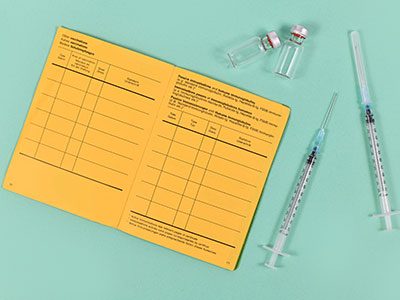Immunizations and flu vaccines, in particular, are a common experience for children to support overall health. While shots are a routine part of doctors’ visits and some children tolerate shots well, others may feel nervous. To help reduce distress and fleeting pain associated with shots, there are many strategies that you can use with your child.
Before the appointment
For many children, it can be helpful to find ways to prepare them before the appointment for the shot. Providing them with clear and age-appropriate information about what to expect can help them to rely on realistic expectations rather than what they may come up with on their own. Be sensitive to the timing of these discussions, as providing information too far in advance can increase worry and providing information immediately before the shot may not give your child enough time to build confidence about it.
- You can calmly walk through the steps with your child: “First, the doctor or nurse will clean your arm, which may feel cold. I can hold your hand if you want and we can focus taking deep breaths (or reading a story, etc.). The stick might feel like short pinch. After the stick, the doctor will put a band-aid on your arm.”
- You can also give them tips ahead of time, such as teaching them how to calm their body (e.g., taking deep breaths, blowing bubbles), and thinking of helpful activities that will distract them before or during the procedure.
- You can remind them of what they have done in the past that helped them when getting a shot.
During the appointment
- There may be some waiting at the doctor’s office. Helping your child to stay distracted while waiting for the medical provider to come into the room will help to decrease feelings of worry about what the appointment will be like or about the needle stick, in particular. Bring books or other calm activities to help them remain engaged in an activity that they enjoy.
- Remain calm and confident. You are your child’s safety net and they will look to you for clues on whether they should feel nervous or not. To provide a sense of calm to your child, it may be helpful for you to take a few deep, relaxing breaths and remember that you are doing a great job in supporting your child. It is also helpful to include your child by having them take a few deep breaths with you – as the more relaxed their body is, the more relaxed their mind will be, and the less pain they will experience.
- Give your child a few, age-appropriate choices. Choices can give your child a sense of control when they feel nervous. For example, “Do you want to sit on my lap or on the table?” (know that some children may need your help to keep their arm secure), or “Do you want to look at me or at your book?” If your child is having a hard time making decisions, then it is appropriate to calmly make decisions for them, focusing on distracting them by telling them a story.
During the needle stick
Help your child to remain distracted and provide encouragement to them about how to cope. Resist the urge to give in to delays – typically, worry increases when the inevitable shot is delayed.
- Distraction: Engage them in conversation about something other than the shot – ask them questions about their day or tell them a story about your day. You and/or the medical provider can count down backwards or forwards – your child may also like to count with you. Read a book, listen to music or watch a short video with your child during the needle stick.
- Relaxation: Have them take deep breaths with you to relax their body, which helps to decrease distress and pain associated with needles. Some children benefit from blowing a pinwheel or blowing bubbles to help them use relaxation strategies.
After the shot
Praise your child for how they coped (“You were very brave! I am proud of you – you did a great job of staying still, talking to me and taking a deep breath!”). This will help to give them a sense of accomplishment – and help to build their confidence for next year’s vaccine. Some children are calm once the shot is over. For others, they may need your help to redirect their attention or focus on something new while their body and mind calm down.
 https://riseandshine.childrensnational.org/wp-content/uploads/2026/02/olympics-feature.png
300
400
webteam
https://riseandshine.childrensnational.org/wp-content/uploads/2017/11/childrens_riseandshine_logo.jpg
webteam2026-02-05 16:41:512026-02-06 08:51:52What the Winter Olympics can teach our children
https://riseandshine.childrensnational.org/wp-content/uploads/2026/02/olympics-feature.png
300
400
webteam
https://riseandshine.childrensnational.org/wp-content/uploads/2017/11/childrens_riseandshine_logo.jpg
webteam2026-02-05 16:41:512026-02-06 08:51:52What the Winter Olympics can teach our children




















Leave a Comment
Want to join the discussion?Feel free to contribute!